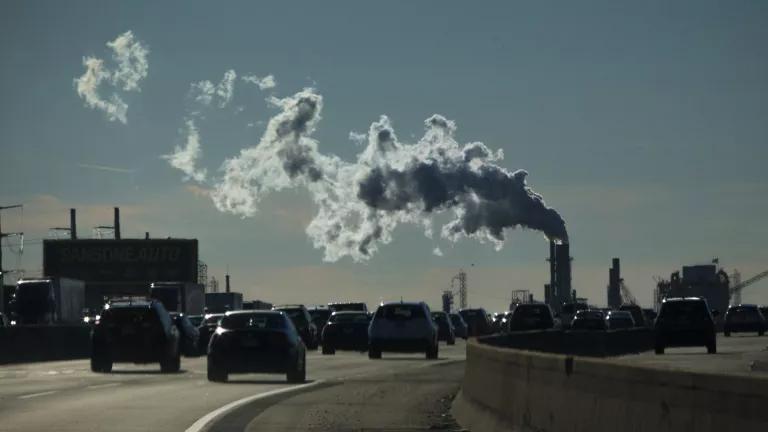The EPA Says It Wants “Scientific Transparency.” What It Really Wants Is Control Over Research.
A newly proposed rule would let Andrew Wheeler decide what kind of science is—and isn’t—allowed to inform our country’s public health protections.

It’s no secret that under the Trump administration, a politicized U.S. Environmental Protection Agency has been doing all that it can to make life easier for polluting industries—first under disgraced former administrator Scott Pruitt and now under his successor, Andrew Wheeler. Rollbacks of our country’s environmental regulations have been streaming out of the agency since 2017.
Even so, it’s difficult to weaken pollution laws when decades of peer-reviewed scientific research holds that doing so would sicken and kill Americans. Now it appears that Wheeler has latched onto a plan to seed doubt into the validity of that science—and, ultimately, to discount it altogether.
First proposed in April 2018, the Strengthening Transparency in Regulatory Science rule—an aptly Orwellian name, in keeping with this administration’s dystopian leanings—would allow the agency to disregard any research containing data that are not made available to the public. In Wheeler’s words, the rule is intended to promote “the highest-quality science.” But notably, if any research relied on anonymous patient data culled from confidential medical records—as much of it does, by law and by necessity—the EPA could then claim that it didn’t meet the rule’s transparency threshold and reject any proposed regulation based on the conclusions of that research.
This plan to undermine science—and ultimately public health— shouldn’t work, and it likely won’t, unless America under Trump has gone completely through the legal looking glass. But the fact that a rule like this is being floated at all points to Wheeler’s (coal-) burning desire to reinvent the EPA as the official policymaking arm of corporate polluters.
There’s more. A recent update to the rule would grant the EPA authority to apply it retroactively. That tiny tweak gives birth to a scary scenario that places both past and future protections in jeopardy. As John Walke, the director of NRDC’s Clean Air program, puts it, the new rule “would let the EPA reopen and weaken existing safeguards for air, water, and public health, or sabotage these protections whenever they come up for renewal.” Among the existing safeguards that could fall under the new rule’s purview are key components of the Clean Air Act and the Clean Water Act.
Walke says the administrator’s real goal “is to prevent the EPA from adopting safeguards against air and water pollution, dangerous climate change, and toxic chemicals and pesticides.” In other words, Andrew Wheeler may very well want scientists to continue using confidential medical data in their studies showing how air and water pollution pose a risk to human health—so he can have a pretext for rejecting those same studies and keeping that kind of science out of the policymaking equation altogether.
On Wednesday, as much of the country was following the televised hearings on impeachment before the House Intelligence Committee, members of the House Science Committee were posing questions to—but getting very few substantive answers out of—the sole representative sent by the EPA to defend its new rule. Dr. Jennifer Orme-Zavaleta, a career scientist whose tenure at the agency stretches back nearly 40 years, appeared supremely uncomfortable as she tried to put the best face on this demonstrably bad idea. (Much of the hearing was captured, in all of its cringeworthy glory, as an epic 68-tweet thread in Walke’s Twitter feed; read it for a valuable lesson in how to avoid answering congressmembers’ pointed questions without permanently damaging your own professional credibility.)
The hearing didn’t go very well for the EPA. Serious questions were raised as to whether the agency even had the legal authority to do what it wants to do. At one point, the EPA’s stone-faced witness was invited by a cheeky congressmember to rebel against her employer and publicly refute the new rule, an invitation that she didn’t accept—but, interestingly, didn’t decline either.
But perhaps the most damning indicator of the rule’s vacuity came during the expert-witness portion of the hearing. Of the various scientific and public-health experts who appeared before the committee to discuss the rule—individuals who had been invited to testify by members of both political parties, mind you—not a single one endorsed it. Next time Andrew Wheeler needs to drum up congressional support for a phony scientific-transparency rule, he should send a chemical company CEO, or perhaps a coal baron. They would undoubtedly have something nice to say about such a horrible policy.
This article was originally published on onEarth, which is no longer in publication. onEarth was founded in 1979 as the Amicus Journal, an independent magazine of thought and opinion on the environment. All opinions expressed are those of the authors and do not necessarily reflect the policies or positions of NRDC. This article is available for online republication by news media outlets or nonprofits under these conditions: The writer(s) must be credited with a byline; you must note prominently that the article was originally published by NRDC.org and link to the original; the article cannot be edited (beyond simple things such grammar); you can’t resell the article in any form or grant republishing rights to other outlets; you can’t republish our material wholesale or automatically—you need to select articles individually; you can’t republish the photos or graphics on our site without specific permission; you should drop us a note to let us know when you’ve used one of our articles.


Trump Hatches a New Plan to Attack Science
Weakening Car Pollution Rules: This May Be Trump’s Dumbest Rollback Yet
The Particulars of PM 2.5